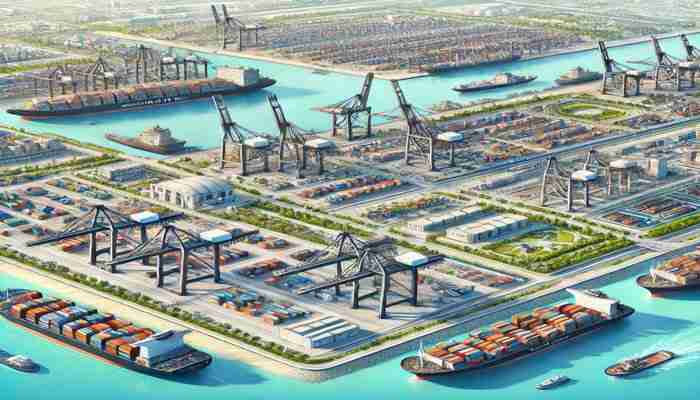
What is Disposition?
What is disposition? The term disposition has its origins in Latin, meaning allocation, division, arrangement, or administration. In the context of logistics and business, disposition refers to a decision-making process that ensures an efficient and organized flow of goods and resources.
Disposition plays a crucial role in ensuring that everything runs smoothly and is properly allocated in business environments. In a production process, a disposition is an important decision that can be incorporated as an order. It involves determining how, when, and where specific actions should be taken. In business, this could mean deciding how resources are allocated to a particular project or how a specific product is moved from one place to another.
In logistics, disposition refers to the management and coordination of moving goods and products through various stages of the supply chain, ensuring that they arrive at their destination efficiently and in optimal condition. This management can be conducted manually by a human dispatcher or with the help of computer-aided scheduling systems, depending on the complexity and scope of the logistical operations.
What is CMR Transport document?
The Importance of Disposition in Business
Disposition in business is more than just the allocation of resources. It involves strategic decision-making that optimizes the efficiency of a company’s production and logistics processes. This practice ensures that tasks are completed on time, resources are allocated effectively, and business objectives are achieved without delays.
Administrative activities, such as disposition, involve careful planning and execution. The decision-maker, often a scheduler or dispatcher, is responsible for organizing the movement of goods, managing timelines, and coordinating with various departments. By maintaining a well-structured disposition process, companies can minimize waste, reduce costs, and improve productivity.
In today’s competitive business environment, disposition is key to ensuring that a company can maintain its competitive edge. The efficient management of resources and processes not only boosts productivity but also improves customer satisfaction by delivering goods and services on time.
Disposition in Logistics
In the logistics and transport sectors, disposition plays an essential role in the movement of goods from one point to another. The goal of disposition in logistics is to ensure that merchandise reaches its destination while considering various traffic-related conditions, legal requirements, and time constraints. It is the disposition process that guarantees smooth operations and reliable delivery schedules.
Schedulers or dispatchers are responsible for managing the transportation of goods. They make decisions on the allocation of trucks, containers, and routes, depending on the availability and demand. They also consider traffic conditions, legal restrictions, and weather forecasts. The primary objective of a dispatcher is to ensure that shipments are completed in a timely and cost-effective manner while minimizing potential disruptions.
With the advancement of technology, disposition in logistics is no longer limited to manual decision-making. Companies now use computer-aided scheduling systems and decision models to make more informed and optimized decisions. These systems use data analytics, machine learning algorithms, and predictive models to determine the best possible routes and schedules for transportation, thereby improving efficiency and reducing costs.
Types of Disposition Systems in Logistics
Disposition systems in logistics can be broadly classified into two types:
- Manual Disposition:
In manual disposition, an employee or dispatcher makes decisions based on their experience and knowledge of the transportation process. This involves assessing the current situation, available resources, and traffic conditions to determine the best approach for moving goods. While manual disposition offers flexibility and a personal touch, it can be prone to human errors and inefficiencies, especially when handling large-scale operations. - Computer-Aided Disposition:
Computer-aided disposition systems are increasingly being used in modern logistics. These systems utilize software and algorithms to optimize routing, scheduling, and the allocation of resources. By analyzing data from various sources, such as traffic updates, weather conditions, and vehicle availability, computer-aided systems can make precise decisions that enhance the overall efficiency of logistics operations.
The integration of both manual and computer-aided disposition often yields the best results, where human expertise complements data-driven decision-making. This combination allows companies to handle complex situations more effectively while also benefiting from the precision and speed of automated systems.
The Role of Disposition in Scheduling and Routing
In logistics, scheduling and routing are fundamental components of disposition. These processes are crucial for ensuring that goods are delivered on time while minimizing costs and avoiding delays.
- Scheduling:
Scheduling refers to the process of determining when a particular shipment will take place. A well-structured schedule allows logistics companies to manage their fleets effectively and maximize the use of available resources. Disposition plays a critical role in creating accurate and efficient schedules by taking into consideration factors such as customer demand, resource availability, and delivery timelines. - Routing:
Routing involves planning the path that a vehicle will take to deliver goods. This is particularly important in minimizing transportation costs and ensuring timely delivery. Disposition helps in selecting the most efficient routes, taking into account factors such as traffic conditions, road closures, and distance. The use of advanced GPS and real-time data allows schedulers to adjust routes dynamically, ensuring optimal delivery performance.
Benefits of Effective Disposition in Logistics
Effective disposition in logistics provides numerous benefits, such as:
- Improved Efficiency:
By optimizing the allocation of resources and determining the best routes, disposition improves the overall efficiency of logistics operations. This ensures that shipments are delivered on time and that vehicles are utilized to their fullest potential. - Cost Reduction:
Efficient disposition reduces operational costs by minimizing fuel consumption, reducing empty miles, and optimizing resource utilization. Computer-aided scheduling systems help in identifying cost-saving opportunities and making data-driven decisions. - Enhanced Customer Satisfaction:
Customers expect their shipments to arrive on time and in good condition. Disposition ensures that delivery schedules are met, resulting in enhanced customer satisfaction and loyalty. - Minimized Risk and Disruptions:
Proper disposition helps in identifying potential risks and disruptions in the supply chain, such as traffic delays or adverse weather conditions. By planning ahead and adjusting schedules, logistics companies can minimize these risks and maintain consistent service quality. - Scalability:
As businesses grow, the complexity of their logistics operations also increases. Effective disposition enables companies to scale their operations seamlessly by ensuring that resources are allocated efficiently, and all logistics activities are well-coordinated.
Disposition in Different Sectors
Disposition is not limited to the logistics sector alone; it is also relevant in various other industries, including manufacturing, healthcare, and retail.
- Manufacturing:
In manufacturing, disposition involves managing the allocation of resources, such as raw materials, machinery, and labor, to ensure that production processes run smoothly. Efficient disposition is critical for meeting production deadlines and optimizing the use of available resources. - Healthcare:
In the healthcare sector, disposition refers to the allocation of medical supplies, personnel, and equipment. Effective disposition ensures that hospitals and clinics have the necessary resources to provide timely and high-quality care to patients. - Retail:
In retail, disposition involves managing the movement of goods from warehouses to stores or directly to customers. Retailers rely on efficient disposition to maintain inventory levels and ensure that products are available when and where customers need them.
Challenges in Disposition
While disposition is essential for efficient logistics and business operations, it is not without challenges. Some of the common challenges faced in disposition include:
- Dynamic Conditions:
The logistics environment is highly dynamic, with factors such as traffic, weather, and customer demand constantly changing. Disposition requires real-time data and quick decision-making to adapt to these changing conditions. - Resource Constraints:
Limited availability of resources, such as vehicles and personnel, can make disposition challenging. Schedulers must find ways to allocate resources efficiently, often under tight constraints. - Coordination and Communication:
Effective disposition requires coordination between different departments, including transportation, warehousing, and customer service. Poor communication can lead to delays and inefficiencies in the logistics process. - Technological Dependence:
While computer-aided disposition systems offer numerous benefits, they also come with challenges, such as the need for significant investment in technology and the risk of system failures. Companies must ensure that their systems are reliable and up-to-date to avoid disruptions.
How to Overcome Disposition Challenges
To overcome the challenges associated with disposition, companies can implement the following strategies:
- Invest in Technology:
Utilizing advanced technologies, such as GPS tracking, AI-driven scheduling systems, and real-time data analytics, can enhance the efficiency of disposition processes. - Continuous Training:
Providing training to dispatchers and schedulers on the latest logistics practices and technologies can improve decision-making and reduce the risk of human error. - Data-Driven Decision Making:
Leveraging data analytics to make informed decisions can help in identifying potential issues before they become major problems, thus ensuring smooth logistics operations. - Effective Communication:
Implementing effective communication channels between departments and stakeholders is crucial for the success of disposition processes. Real-time updates and collaboration tools can enhance coordination and minimize delays.
Disposition About S.S.S. (Frequently Asked Questions)
- What is disposition in logistics?
Disposition in logistics refers to the management and scheduling of the movement of goods, ensuring efficient allocation of resources and timely deliveries. - How does disposition improve efficiency in logistics?
Disposition improves efficiency by optimizing routes, schedules, and resource allocation, reducing operational costs, and minimizing delivery delays. - What is the difference between manual and computer-aided disposition?
Manual disposition involves decision-making by a dispatcher, while computer-aided disposition uses software and algorithms to optimize logistics processes for better efficiency. - Why is disposition important for customer satisfaction?
Disposition ensures timely deliveries and efficient logistics operations, which enhances customer satisfaction by meeting delivery expectations and providing reliable service.






